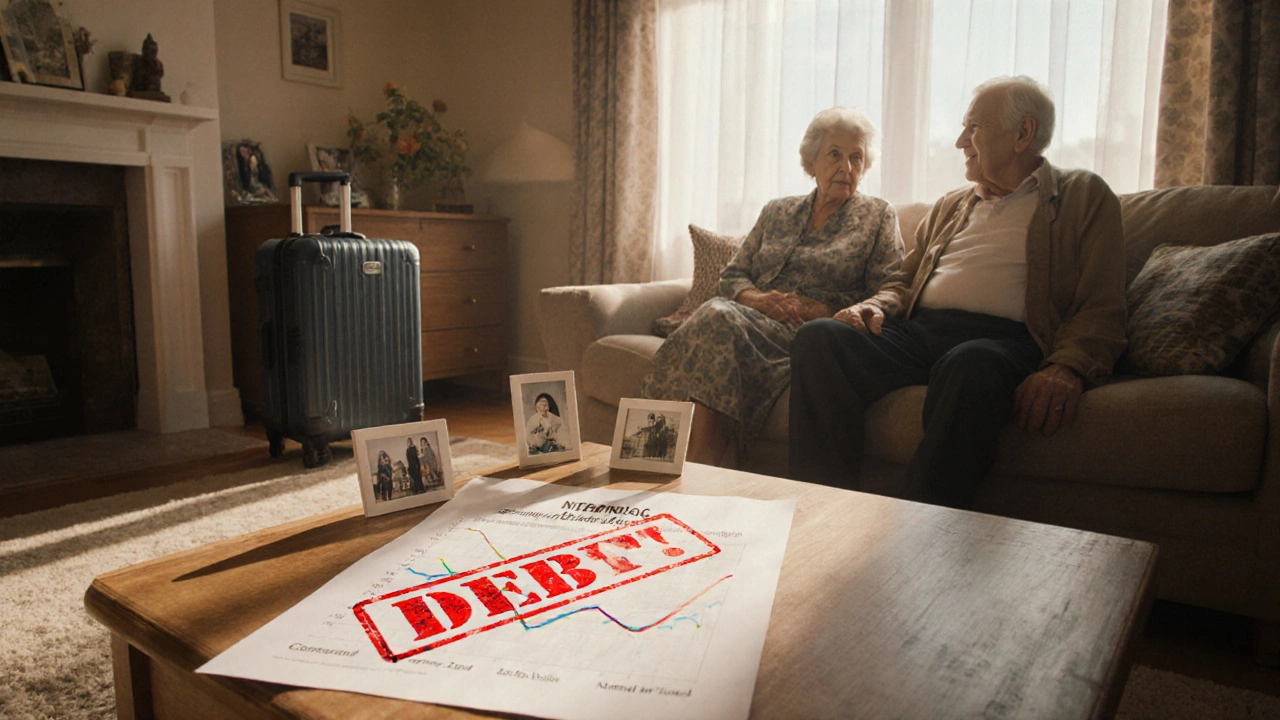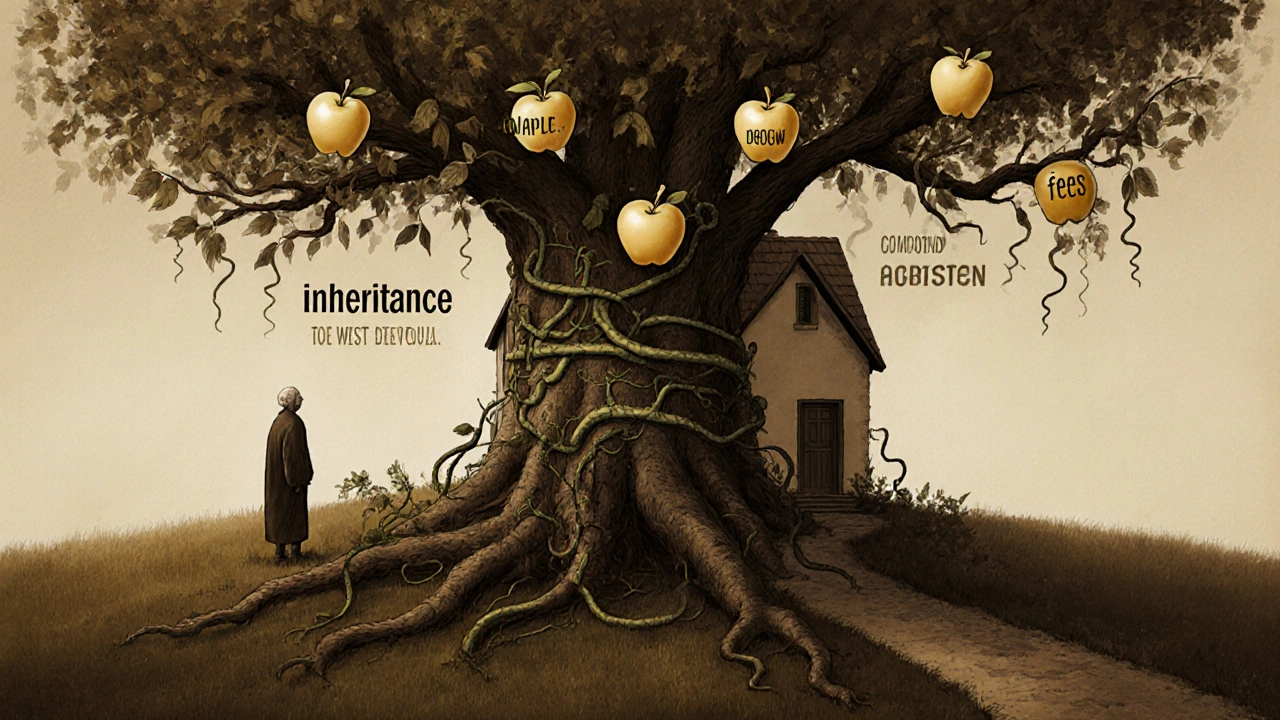What Is the Downside to Equity Release? Hidden Costs and Real Risks
 Nov, 20 2025
Nov, 20 2025
Equity Release Compound Interest Calculator
Equity release sounds simple: you’re older, you own your home, and you need cash. So you unlock some of the value in your house - without moving. It’s marketed as a lifeline for retirees who want to travel, help family, or cover medical bills. But behind the smooth promises are serious trade-offs that many people don’t fully understand until it’s too late.
You’re Giving Up Part of Your Home’s Future Value
When you take out an equity release plan, you’re not borrowing money you’ll pay back with monthly payments. Instead, the lender gives you cash now, and gets paid back - with interest - when you die or move into long-term care. That means the amount you owe grows over time. And when your home is sold, the lender takes their share first. What’s left goes to your estate - if anything.
Let’s say your home is worth $500,000 and you release $150,000. After 10 years, with compound interest at 6%, you could owe $270,000. That’s more than half your home’s value gone. If the house hasn’t appreciated much, your children might get nothing. Many families assume their home will be passed down. Equity release can erase that plan.
Compound Interest Is the Silent Killer
Most equity release plans use compound interest. That means you’re paying interest on the interest. It doesn’t sound bad at first. But over 15 or 20 years, it snowballs fast. A $100,000 loan at 5.5% interest becomes $220,000 in 15 years. At 7%, it hits $275,000. That’s not inflation - that’s debt growing faster than most homes appreciate.
Compare that to a traditional mortgage. With a mortgage, you pay down the principal every month. With equity release, you pay nothing until the end. The debt keeps climbing. By the time the plan ends, you could owe more than your house is worth - though most plans have a no-negative-equity guarantee. That protects you, but it doesn’t protect your heirs.
You Could Lose Eligibility for State Benefits
If you’re receiving government benefits like Guaranteed Income Supplement (GIS) in Canada, a lump sum from equity release could disqualify you. The government looks at your total assets and income. A $100,000 cash payout might push you over the asset limit. Suddenly, you’re paying more for prescriptions, losing your heating allowance, or having your housing benefit cut.
Some people don’t realize this until their next benefit review. The cash might seem like a gift - but it’s treated like savings. You can’t just spend it all right away to stay eligible. There are strict rules about how and when you use the money. And if you’re caught hiding it, you could face penalties.
It Limits Your Future Options
Once you sign an equity release agreement, you’re locked in. Want to move to a smaller home? You can’t. Want to downsize to be closer to family? You can’t without paying off the full loan - which might be hundreds of thousands more than you borrowed. Want to switch lenders for a better rate? Most plans don’t allow it.
Life changes. Health declines. Family needs shift. But your equity release contract doesn’t bend. You’re tied to your home - even if it’s no longer the right fit. That’s a big risk for people who thought they were gaining flexibility.

High Fees and Hidden Costs Add Up
There’s the interest. Then there’s the setup costs: legal fees, valuation fees, advisor fees, and arrangement fees. These can easily run $3,000 to $6,000. Some providers hide these in fine print. You might think you’re getting $100,000 - but after fees, you get $94,000. And you’re still paying interest on the full $100,000.
Some plans charge early repayment penalties. If you change your mind after a year, you could pay thousands to get out. Others charge ongoing management fees. These costs aren’t always clear until you read the full contract - and many people don’t.
You Might Outlive the Money
One common mistake: taking a big lump sum and spending it all upfront. You think, ‘I’ll enjoy this now.’ But if you live 20 more years, you’ve got no safety net left. Medical bills, home repairs, or long-term care costs could come out of your own pocket - and you’ve already used your biggest asset.
Some people choose drawdown plans instead - taking money as you need it. That’s smarter. But even then, people often withdraw too much too soon. Without a budget or financial plan, the cash disappears faster than expected. And once it’s gone, you can’t get more.
It Can Strain Family Relationships
Many people take out equity release to help their kids buy a home or pay off student debt. It feels generous. But it often backfires.
Adult children might feel guilty if they benefit from the money. Others might resent the parent for spending it on a vacation instead of saving for care. Siblings can fight over who gets what when the house is sold. And if one child helped care for the parent, while another didn’t, the inheritance imbalance can cause lasting damage.
These aren’t theoretical problems. I’ve seen families break apart over this. One client in Toronto released $200,000 to help her daughter buy a condo. Five years later, she needed home care. Her daughter couldn’t afford to pay for it. The other two children were furious. The house sold for $550,000. After the loan was paid, there was $120,000 left. One child got $40,000. The others got nothing. Lawsuits followed.

There Are Better Alternatives
Before you sign anything, ask: Is there another way?
- Downsizing: Sell your big house, move to a smaller one, and pocket the difference. No debt. No interest. Full control.
- Reverse mortgage alternatives: Some credit unions offer low-cost home equity lines of credit with fixed rates and monthly payments. You pay as you go.
- Government programs: In Canada, programs like the Home Owner Grant or property tax deferrals can help if you’re struggling with bills.
- Part-time work or renting out a room: A spare bedroom can bring in $1,000 a month. That’s $12,000 a year - without touching your home’s value.
These options don’t erase your equity. They preserve it. And they give you more control.
What You Should Do Before Signing
If you’re still considering equity release, here’s what to do:
- Get free, independent advice from a Financial Conduct Authority (FCA)-regulated advisor. Don’t take advice from the lender.
- Ask for a full illustration showing what you owe after 5, 10, and 20 years.
- Run the numbers: Will your estate still have anything left? Will you still qualify for benefits?
- Talk to your family. Get their input. Don’t make this decision alone.
- Consider a drawdown plan - not a lump sum. Take only what you need, when you need it.
Equity release isn’t evil. For some, it’s the only way to live comfortably in retirement. But it’s not a magic solution. It’s a trade-off - and you need to know exactly what you’re giving up.
Is equity release safe?
It’s legally safe if you use an FCA-regulated provider and get independent advice. But safety doesn’t mean it’s right for you. The biggest risks aren’t fraud - they’re financial loss, reduced inheritance, and losing access to benefits. Many people feel trapped later because they didn’t understand how compound interest works.
Can you lose your home with equity release?
No, you can’t be forced out of your home as long as you live there. Most plans include a no-negative-equity guarantee, which means you’ll never owe more than your home is worth. But while you keep your home, your ownership stake shrinks over time. Eventually, the lender owns most of it - and your heirs get whatever’s left after the loan is paid off.
How much can you release from your home?
It depends on your age, your home’s value, and your health. Most lenders let you release between 20% and 60% of your home’s value. If you’re 65 and your home is worth $500,000, you might get $150,000 to $250,000. If you’re older or have health issues, you may qualify for more. But the older you are, the less you can take - because the lender expects to wait longer to get repaid.
Does equity release affect your pension?
It doesn’t affect your state pension directly. But if you take a lump sum and it increases your total savings above the threshold, you could lose means-tested benefits like the Guaranteed Income Supplement (GIS) or property tax credits. The pension itself stays the same - but your overall income and assets are what matter for eligibility.
What happens if I want to repay the loan early?
You can usually repay early, but it’s expensive. Most equity release plans charge early repayment fees - sometimes as high as 25% of the outstanding balance. These fees drop over time, but in the first five years, they can be brutal. Only consider this option if you have a clear plan to pay back the loan - like selling another asset or receiving a large inheritance.
Final Thought: Think Long-Term, Not Short-Term
Equity release is tempting because it solves today’s problem. But it doesn’t fix tomorrow’s. If you need $50,000 to fix your roof, maybe you can borrow from family or take a small personal loan. If you want to travel, maybe you can save for a year and go cheaper. If you’re worried about care costs, consider long-term care insurance instead.
Your home is more than an asset. It’s your security. Once you give away part of it, you can’t get it back. And if you live longer than expected - which most people do - you’ll wish you’d held on to it.
